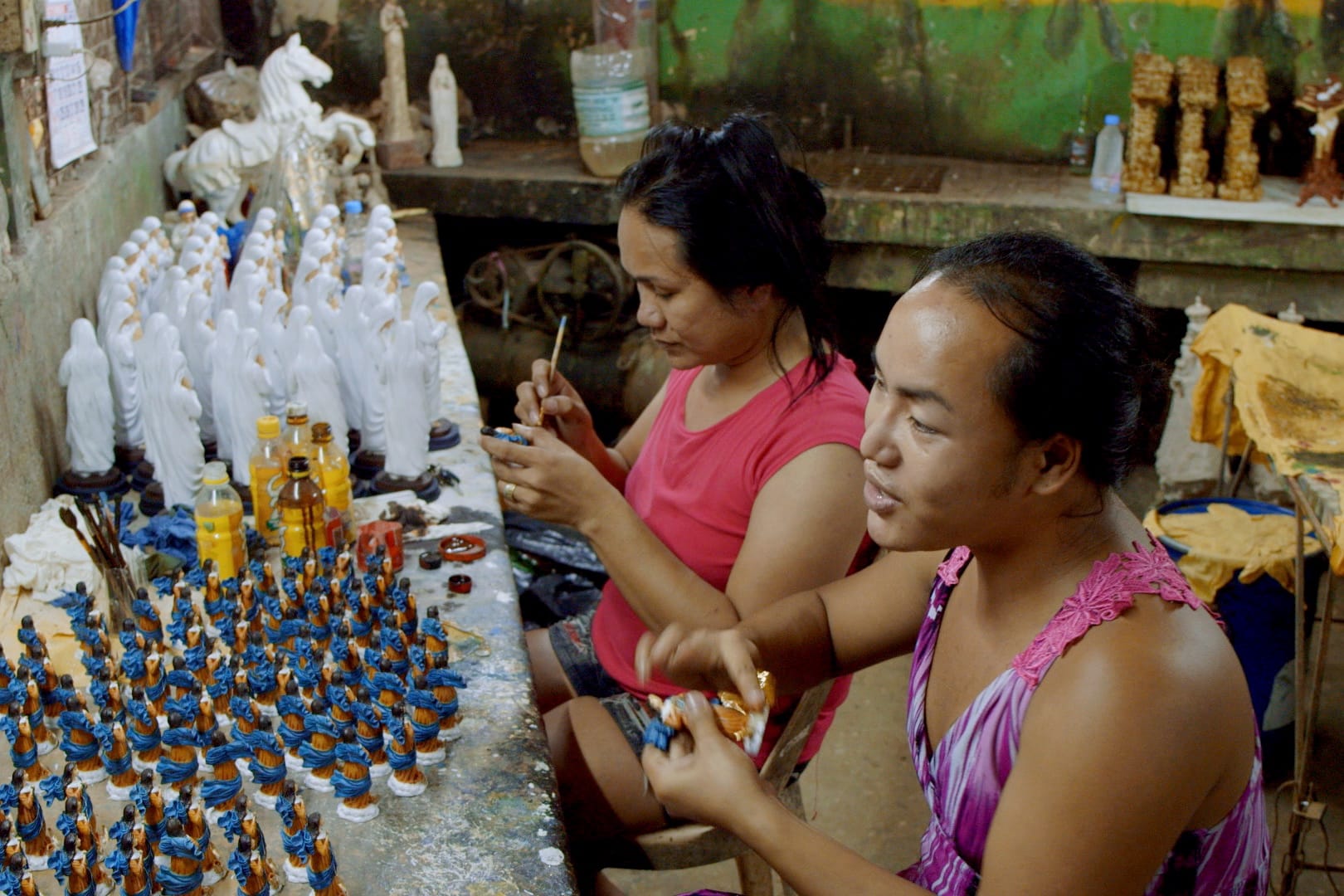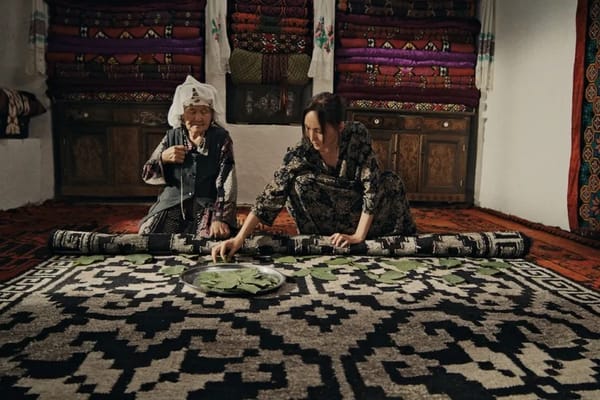Is Southeast Asia Becoming The New Europe?; Local Indies Thrive On Funds, Labs & Co-productions

Let’s face it – even with Avatar: The Way Of Water bringing some much needed year-end box office cheer, 2022 has been a bit of a depressing year. The roaring ‘20s post-pandemic recovery we were promised has yet to materialise. So I’m going to end the year with an uplifting story – examining the recent success of Southeast Asian independent cinema – but ever the realist, I’m also going to ask if this success is sustainable, given that the region has a few challenges of its own. This is a long story, so I’m splitting it across two newsletters. First part will look at what happened to Southeast Asian cinema this year…
Southeast Asian indie cinema has had another stellar year on the international film festival circuit, starting with two films from female directors – Leonor Will Never Die, from the Philippines’ Martika Ramirez Escobar, which won the Special Jury Award: Innovative Spirit in Sundance’s World Cinema Dramatic competition, and Indonesian filmmaker Kamila Andini’s Before, Now And Then (pictured above), which won best actress in Berlin.
Cannes saw the premieres of Cambodian-French filmmaker Davy Chou’s Return To Seoul and Japanese filmmaker Chie Hayakawa’s Plan 75, which has an actress and producers from the Philippines on board. Premieres at Locarno included Malaysian filmmaker Woo Ming Jin’s Stone Turtle, which won the Fipresci prize, and Sorayos Prapapan’s Arnold Is A Model Student. Autobiography, from Indonesia’s Makbul Mubarak, premiered in Venice’s Orizzonti section, where it won the Fipresci prize, kicking off a festival and awards haul that includes more than a dozen prizes.
Busan continues to be a solid platform for Southeast Asian cinema and premiered three films from the region in its New Currents competition: He Shuming’s Ajoomma (Singapore-Korea), Sam Quah’s A Place Called Silence (Malaysia) and Marcus Vu Manh Cuong’s Memento Mori: Earth (Vietnam).
Bui Thac Chuyen’s Glorious Ashes premiered at Tokyo, marking the first time the festival had selected a Vietnamese film for competition. Then in Southeast Asia, a circuit of smaller festivals returned as in-person events this autumn, with all the above-mentioned titles and more reaching local audiences and picking up additional honours (see here for a round-up of the winning films).
Of course, this is not a new phenomenon – Southeast Asian films have been premiering and winning prizes at top European and Asian film festivals for some time. But the volume of award-worthy titles appears to be increasing, and as usual with these surges in recognition, the factors behind this are closely connected to funding and development programmes.
Two of the earliest initiatives started life in Thailand – private fund Purin Pictures, which offers production and post-production grants in two funding rounds each year, and the Southeast Asia Fiction Film Lab (SEAFIC), which closed earlier this year after a run of six years, but kicked off a trend for labs across the region.
Growth Of Public & Private Funding
In 2019, Southeast Asian indies received a major boost when the Singapore Film Commission (SFC) launched the Southeast Asia Co-production Grant (SCPG). The fund offers up to $220,000 (S$300,000) to projects directed by non-Singaporean, Southeast Asian directors with at least one Singaporean and one Southeast Asian producer on board.
The SCPG has supported many of the films currently making waves on the festival circuit, including Arnold Is A Model Student, Autobiography and Glorious Ashes. More recent awardees include horror thriller In My Mother’s Skin, directed by the Philippines’ Kenneth Dagatan, which will premiere in Sundance film festival’s Midnight section.
Shortly afterwards, the Film Development Council of the Philippines (FDCP) launched two co-production schemes – the International Co-production Fund (ICOP), for co-productions directed by filmmakers from the Philippines, and the ASEAN Co-production Fund (ACOF) for films from Southeast Asian directors – which have supported projects including In My Mother’s Skin, documentary Divine Factory and Autobiography.

And although Taiwan is not strictly speaking in Southeast Asia, the Taiwan Creative Content Agency (TAICCA) has also started funding Southeast Asian projects through its Taiwan International Co-funding Program (TICP). Recent awardees include Singapore filmmaker Jow Zhi Wei’s Tomorrow Is A Long Time, which also received funding from Singapore and France, and will premiere in Berlin film festival’s Generation 14plus section.
In My Mother’s Skin is another good example of how this funding nexus is starting to work. The film is a co-production between the Philippines, Singapore and Taiwan, and in addition to Singapore’s SCPG grant and the Philippines’ ICOF, also received funding from Taiwan’s TICP.
Then there’s also investment flooding into the region from global, regional and in-country streamers. While most of the streamer cash is heading towards episodic series, some is helping films to get made. It doesn’t flow into every Southeast Asian country – currently the focus is on Indonesia, Thailand and, to a lesser extent, the Philippines – but it’s keeping the wolf from the door for many Southeast Asian independent producers.
The almost immediate impact of this influx of public and private money is that production budgets in the region have started to rise – not anywhere close enough to spark fears of bloating, but enough to increase production values to the point where Southeast Asian cinema can compete with European films.
“Some productions in the region now have budgets touching $1m, which was rare for an independent film before,” explains Singapore-based producer Jeremy Chua. “That will eventually make it easier to work with countries outside the region, for example Australia, as official co-productions require a certain level of spend in Australia or Singapore.”
Chua, who has credits on films including Tomorrow Is A Long Time and Autobiography, is one of a new breed of producers in the region who are becoming active as co-producers on films originating in other Southeast Asian countries, in addition to developing their domestic projects, as they can bring funding and distribution opportunities, similar to the way that many German production companies have positioned themselves.
Collective spirit
Other active co-producers include Singapore’s Momo Film Co (Si En Tan & Kris Ong) and Akanga Film Asia (Fran Borgia) and Will Fredo’s Fusee and Alemberg Ang’s Daluyong Studios in the Philippines. These producers are also continuing to tap into European funds and co-producers, in addition to Busan film festival’s Asian Cinema Fund (ACF), which were the only real sources of funding for Southeast Asian indies before the regional funds came along.
Daluyong, for example, is working with US-Vietnamese production outfit East Films and France’s Girelle Production on Vietnamese filmmaker Minh Nguyen-Vo’s Picturehouse; and with Kino Media Nusantara (Indonesia), PS Films Production (Myanmar) and M'GO Films (Singapore) on The Beer Girl In Yangon, directed by Myanmar’s Sein Lyan Tun.
He’s also working with Singapore-based companies including Momo Film Co on Don’t Cry Butterfly, directed by Vietnam’s Duong Dieu Linh, and Giraffe Pictures on Some Nights I Feel Like Walking, directed by the Philippines’ Petersen Vargas.
Indonesian producer John Badalu (The Beer Girl In Yangon) says that this collaboration is also a way for filmmakers to overcome the huge differences across the region in terms of economic development, production infrastructure and government support. “The Beer Girl In Yangon is the kind of film that had to explore co-production, because neither of the two original countries of production [Myanmar & Indonesia] have a solid funding scheme, so we needed to look elsewhere,” Badalu explains.
“Most emerging filmmakers would also need a capacity-building program at an international level to put together a solid production,” Badalu continues. “Usually, I work with partners who share my vision and prefer companies that don’t have too many projects at the same time so we can concentrate better. I also look for a company that can bring something to the project, not just financially.”

Over the past few decades, co-production across Asia has tended to ebb and flow in waves, rather than being a constant. Southeast Asian co-production was hindered by the huge linguistic and cultural differences between countries, with each film industry tending to focus on its own audience and star system. But now a more collective spirit is emerging, similar in nature to the financing and distribution scene in Europe. It will be interesting to see if it develops along similar lines to Europe in terms of benefits (more funding, bigger budgets, wider market) and pitfalls (contrived packaging, Asia-puddings).
One last thought before we wrap up this week. Girelle Production’s Johann Chapelan points out that all the funding in the world won’t make a difference if filmmakers don’t have anything interesting to say. In that respect, both South Asian and Southeast Asian filmmakers are in a strong position, based in a part of the world where stories connected to nearly all the contemporary fault lines – class divisions, democracy vs authoritarianism, sexual mores, gender, race, caste and religion – are being played out on a daily basis.
“Cinema is booming in Southeast Asia and offers a new voice on contemporary issues from a new generation of filmmakers,” says Chapelan. “I believe South and Southeast Asian cinema can nourish and enlighten us, using new methods of storytelling and radical aesthetics. These filmmakers deal with daring and meaningful topics from women's rights, abuse and exploitation, popular history, and sex and relationships in a world dominated by toxic masculinity on the rise.”
In other words, there is no shortage of stories to be told. But in a region that is not known for its political and economic stability, can this new Southeast Asian cinema wave really last? Next week’s newsletter will look at its sustainability and what’s in store in 2023.
THIS FORTNIGHT IN THE TRADES:
AWARDS SEASON:
‘Elvis’ Dominates Australia’s AACTA Awards, Chris Hemsworth Accepts Trailblazer Prize
LAB & FUNDING NEWS:
Alaa Eddine Aljem’s ‘Eldorado’ among Rotterdam 2023 CineMart selection
‘Vagabonds,’ ‘Scapegoat,’ ‘Aisha Can’t Fly Away Anymore’ Among Top Winners at Red Sea Souk
Saudi Arabia To Launch $233m Film Financing Program Open To Local & Professional Entities in Q1 2023
PRODUCTION NEWS [OUT OF RED SEA FEST]:
Saudi Arabia’s Film AlUla Begins Construction On Large Studio Complex
PRODUCTION NEWS [OUT OF SINGAPORE FEST]:
Rebecca Lim Leads Chiller ‘Confinement’ For Clover Films, iQiyi (EXCLUSIVE)
‘Fallen 8’ Animation Series Set at KC Global and Singapore’s IMDA
Transgender Japanese Gangster Tale ‘Chameleon’ Set by Brillante Mendoza (EXCLUSIVE)
PRODUCTION NEWS [OTHER]:
Warwick Thornton drama ‘The New Boy’, starring Cate Blanchett, wraps production in Australia
Japan’s Sabu to direct Korean-Language Thriller ‘Under Your Bed’
CORPORATE:
Daniel Manwaring Named IMAX China CEO
Fremantle Names Ganesh Rajaram CEO In Asia And Latin America
VFX Veteran Alaric McAusland to Head DNEG Facility in Sydney
MM2, Man Man Er Seek Investment in Taiwan Content Firm Million Star
‘Godzilla’ Studio Toho Makes Key Appointments for U.S. Outreach, E-Commerce Venture (EXCLUSIVE)
CANCELLED:
Iranian Director Asghar Farhadi Demands Release Of Arrested Actress Taraneh Alidoosti
Turkish government demands repayment of funding from Queer Palm-nominated ‘Burning Days’
Cineworld Boss Mooky Greidinger Handed 6-Month Suspended Sentence And $28,000 Fine In Israel
CURATED:
Rotterdam Film Festival Reveals Full Program Including Tiger Competition
Berlinale sets first Panorama, Generation titles for 2023 edition
Red Sea Film Festival Winners: ‘Hanging Gardens’ By Ahmed Yassin Al Daradji Takes Best Film Award
RELEASED:
‘Avatar: The Way Of Water’ Sailing Past $500M Global Box Office
Studio Ghibli Sets New Hayao Miyazaki Film ‘How Do You Live’ For Summer 2023 Release
Makoto Shinkai’s Anime Hit ‘Suzume’ Sets U.S. Theatrical Release Date
‘Puss In Boots: The Last Wish’ Secures December China Release
Bangladesh’s Oscars Submission ‘Hawa’ To Receive Historic India-Wide Release Via Reliance, CEPL
STREAMING UPDATES:
‘Citadel’: Varun Dhawan To Star In Indian Series Set In Amazon Franchise
Netflix Sets Live-Action Film Adaptation of Classic Manga ‘City Hunter’ (Exclusive)
Netflix’s ‘Baggio’ Film to Play in China, Tap Into World Cup Fever (EXCLUSIVE)




